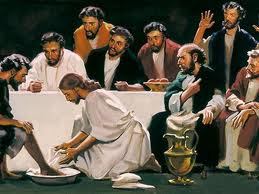
If a wealthy multi-billionaire sent his son to live in a foreign country, he would be sure that his son had a luxurious place to live, was granted special privileges by the government of that country, and enjoyed a comfortable lifestyle. He would insist that his son be treated with the dignity he deserved.
It is always puzzling to us why God who is far more powerful and wealthier than the richest person on earth, would send his Son to earth and let him be treated as a poor, itinerant rabbi. From the moment he was born in a lowly stable with a feeding trough for a bed, to the moment when he died, nailed to a cross as the worst of criminals, Jesus seldom received worse than reasonable treatment from his contemporaries. God could easily have arranged that Jesus be born in a palace and treated with the dignity that the greatest king deserves. We wonder why God the Father didn’t make it easier for his Son when he spent his short time on earth.
Did Jesus, in turn, plan that his leaders be given special treatment—to have it better than he did? Let’s listen (Luke 17:7-10).
“Jesus said to the Apostles: ‘Who among you would say to your servant who has just come in from plowing or tending sheep in the field, “Come here immediately and take your place at table?” Would he not rather say to him, “Prepare something for me to eat. Put on your apron and wait on me while I eat and drink. You may eat and drink when I am finished.”’
Remember the categories of Jesus’ followers? There was the crowd, the disciples, and the Apostles who were the leaders-in-training. Here he is speaking specifically to the Apostles. They were to see themselves at the level of servants who plow the field or tend the sheep, rather than the owners of a plantation who had others do their work. Rather than expect special treatment when they came in from the field, they went straight to their next task—putting on aprons and preparing food for their master.
This doesn’t make any sense to us, does it? Nor did it make sense to the Apostles. Those in leadership positions, especially in a king’s palace, or given preferential treatment. They expect others to carry out their orders, do their yard work and prepare their meals. What kind of leader would see himself as an ordinary servant, who was the last to sit down at table and eat? This must have been confusing for the Apostles who envisioned themselves as sitting at the head table in the Kingdom of God. They were to see themselves as the “little shots” rather than the “big shots.”
In doing this they would be walking in the footsteps of Jesus, who during his final meal on earth, put a towel around his waist and washed the dirty feet of his Apostles. What more lowly position could Jesus have taken.
Jesus concluded with,
“When you have done all you have been commanded, say, ‘We are unprofitable servants; we have done what we were obliged to do.”
Like Jesus, they were just carrying out the orders that God gave them to do. In the end rather than receive fanfare from their contemporaries, all but one of them would end up in disgrace, just as Jesus had done. The Apostles were appointed by God to do a job. As faithful servants, they were to carry out their task, mindful they were always the servants, never the masters. After hearing this, how many disciples raised their hands and said, “Can I be an Apostle too?”
Why is it that Jesus’ values seem upside-down compared to those of the world? Why does he spend so much time reminding his selected leaders that must see themselves as “unprofitable servants?”
When the world system and even the Church system treats us the way Jesus was treated, isn’t this cause for rejoicing rather than an occasion to complain?
